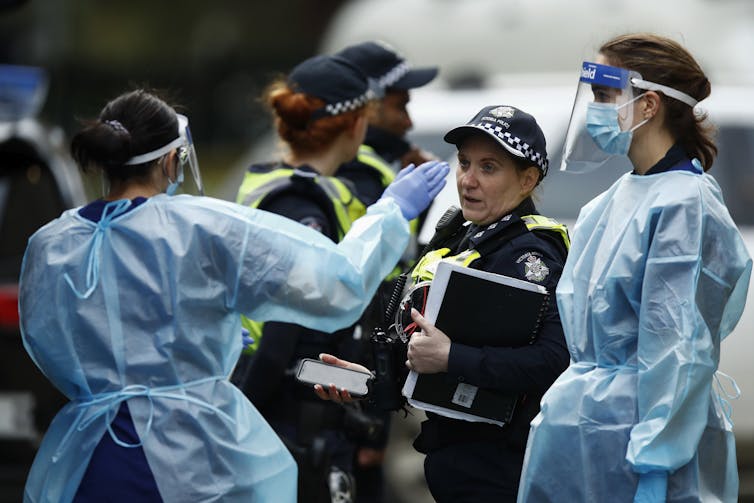Victoria is undeniably in a second wave of COVID-19. It's time to plan for another statewide lockdown
- Written by Adrian Esterman, Professor of Biostatistics, University of South Australia
Victoria recorded its largest daily increase of 127 new COVID-19 cases on Monday, 16 more than the previous peak of 111 cases on March 28.
As I recently wrote, there’s no formal definition of what constitutes a second wave, but a reasonable one might be the return of an outbreak where the numbers of new daily cases reach a peak as high or higher than the original one.
By that definition, a second wave has arrived in Victoria. So why isn’t the state back in lockdown?
What can be done to bring the outbreak under control?
The current strategy of mass testing and information campaigns in hotspot areas, and quarantining whole tower blocks, may not be working. Regardless, cases are now appearing outside the hotspot areas, among people who were most likely infected before the latest measures were put in place.
The Victorian government must now seriously consider going back into statewide Stage 3 lockdown restrictions. Under these rules, there are only four reasons to leave your home: shopping for food and supplies, care and caregiving, exercise, and study and work if it can’t be done from home. And exemptions to quarantine rules should not be granted.
 Targeting hotspot areas isn’t enough. Victoria must consider reintroducing Stage 3 lockdown restrictions.
Daniel Pockett/AAP
Targeting hotspot areas isn’t enough. Victoria must consider reintroducing Stage 3 lockdown restrictions.
Daniel Pockett/AAP
Testing should no longer be a choice. People in 14-day quarantine should be tested on day 11, and if they refuse, made to go into another 14 days of quarantine. Breaking quarantine should be a serious offence.
Far better communication is needed to explain why these measures are essential, and health authorities should ensure their messaging also reaches those who do not speak English as a first language.
People should be encouraged to wear face masks whenever outside. There is increasing evidence they are effective in areas of high transmission.
Much more must be done to educate the public about panic buying. If necessary, Australian Defence Force personnel could be used to deliver food and essential supplies to those at high risk, and assist with logistics.
The newly announced closure of the New South Wales and Victoria border is welcome, and probably overdue. It comes after a returned traveller who quarantined in Melbourne tested positive to the virus after working at a Woolworths in Sydney.
Some people living in border communities will be granted an exemption from this closure, including those whose nearest health provider or place of work is just across the border. Hopefully they will be closely monitored and regularly tested.
Finally, all other states and territories should rally to assist Victoria. It is in everyone’s interest to defeat this outbreak.
Where to from here?
At this stage, the situation is unclear. Daily cases could still rapidly increase, or we could have reached the peak and we might start seeing cases subside. However, the number of new cases each day isn’t necessarily the critical factor. More important is the daily number of new community-acquired infections. Because we have no idea where these people got infected, it makes controlling the situation very difficult.
Other cases are not a major threat as it’s possible to contain them with quarantine and contact tracing. If necessary, additional staff experienced at contact tracing can easily be brought in from other states.
The first epidemic wave was controlled by imposing severe restrictions. Unfortunately, history might have to repeat itself.
This article is supported by the Judith Neilson Institute for Journalism and Ideas.

